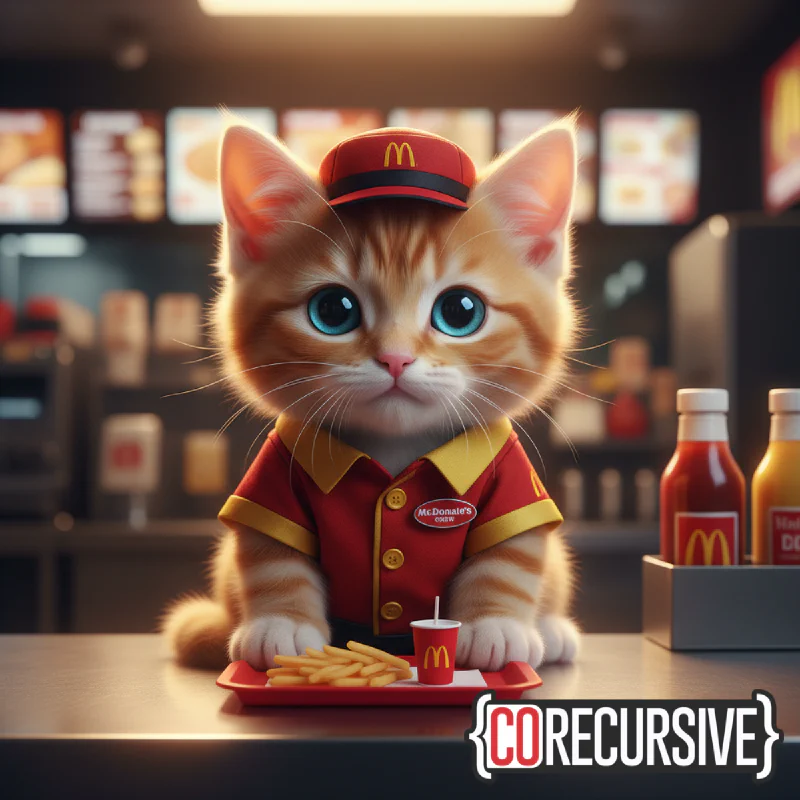All Episodes
Welcome to CoRecursive. A Podcast where each episode someone shares the fascinating story behind a piece of software being built.
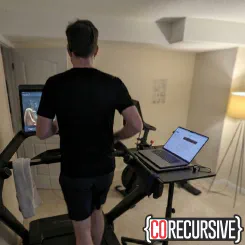
The Universal Paperclip Clicker
#118b Feb 4, 2026 10:56Multiple VS Code windows. “Agent stopping” in a robot voice. A laptop stand on the treadmill so Claude can keep working while I run. The Big Rich sitting unread by the fireplace while I check if the migration’s done.
Somewhere along the way, I started reorganizing my life around keeping the machine spinning. Claude Code had become my universal paperclip clicker. This is me trying …

Inside Early Google
#118 Jan 2, 2026 37:39Ron Garret left JPL for a 100-person startup he’d just discovered on Usenet. Four a.m. alarms. Burbank to San Jose on Southwest. A rented room in Susan Wojcicki’s house.
He expected the search engine engineering and instead he got asked to build ad serving. In Java and with JSPs and no syntax highlighting and no delimiter balancing.
Launch week was a stampede and then a window on his screen fills …
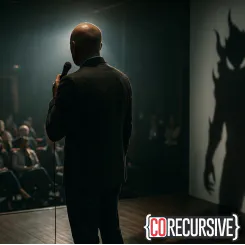
The Bug He Couldn't Name
#117 Dec 2, 2025 44:27Imagine facing a problem you can’t name, something that feels bigger than any bug you’ve ever had to fix. How do you debug your own mind when you don’t even know what’s wrong?
Burke Holland’s story starts with a college party and a bad trip that leaves a deeper mark than he expects. Sleep gets harder. Fear creeps in. His life starts shrinking. School falls apart, friends drift away, and he ends up …
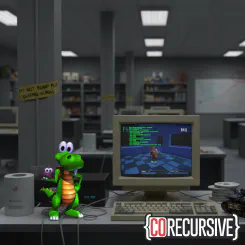
Godbolt's Rule
#116 Nov 4, 2025 00:44:13What do you do when your code breaks and the only fix is to dig into the runtime below?
Matt Godbolt lives for that. Tile-based renderers, color-coded scanlines, zero-copy NICs—each story is a clue that leads past the abstraction to the real machine. He shares the rule that guides him: master your layer, learn the one below, and know the outline of the layer under that.
Matt Godbolt’s …

Risk Rolls Downhill
#115 Oct 2, 2025 55:00What if a software bug drained your savings, ruined your reputation, and nobody believed it wasn’t your fault?
Scott Darlington took over a village post office, hoping to give his family a steady life. But the software system kept showing cash shortfalls he couldn’t explain. Each time, the Post Office told him the numbers were right and made him pay the difference out of his own pocket.
Eventually …

Podcast Update
#114b Sep 2, 2025 08:51A quick update from Adam about the podcast’s current state, consistency challenges, and what’s coming next.
Coding in the Red-Queen Era
#114 Aug 6, 2025 40:00What do we risk when we let AI do the heavy lifting in our coding? Are we giving up the thinking that makes us good at what we do? And as expectations keep rising to match productivy gains, is all this speed really helping, or just making us busier?
Today, let’s look at the tradeoffs of coding with AI and why the hardest part might be deciding what to hold onto, and what to let go.
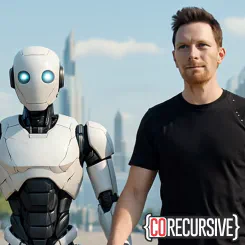
When AI Codes, What’s Left for me?
#113 Jul 2, 2025 40:00I’ve always found meaning, and a lot of strength, in building things. Now, with AI coding agents changing the way we work, it’s easy to feel threatened, like something essential might get taken away. But honestly, that creative urge can’t be replaced by any tool.
In this episode, I talk about what it’s like when your identity is tied to making things, and the tools suddenly change.
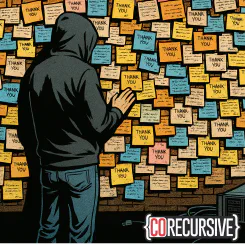
Coding Through Chaos
#112 Jun 3, 2025 49:00What if your search for connection took you somewhere you never meant to go—almost costing you everything?
John Walker grew up building computers and exploring early internet forums, always looking for a place to fit in. As a teenager, he hacked his school network and spent hours on IRC, but loneliness crept in. Drugs became a fun exploration and a social experiment. But soon, addiction pulled him …
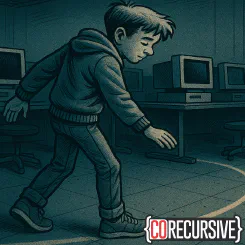
The Power of Context: Reimagining Learning
#111 May 2, 2025 45:00Have you ever found yourself in a situation where learning felt like an uphill battle? Like no matter how hard you tried, the pieces just wouldn’t fall into place?
Steve Krouse’s story shows the power of the right learning environment. As a child, Steve felt he wasn’t good at math. But everything changed with an afterschool program called IMACS. Initially skeptical, he soon …
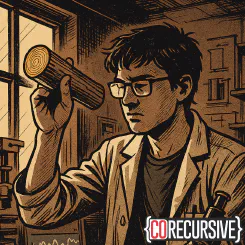
briffa_sep98_e.pro
#110 Apr 2, 2025 57:33Can a single line of code change the way we see science, policy, and trust?
In this episode we explore the “Climategate” scandal that erupted from leaked emails and code snippets, fueling doubts about climate science. What starts as an investigation into accusations of fraud leads to an unexpected journey through the messy reality of data science, legacy code struggles, and the complex …
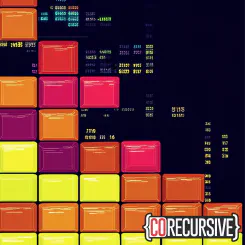
HATETRIS
#109 Mar 3, 2025 48:11What if a simple game became a gateway to computational breakthroughs? David Freiberg and Felipe set out on a journey to conquer Hatetris, a notoriously difficult JavaScript game. Their interest ignited when a new world record was set, showing that surpassing the game’s high score was possible.
Their journey was full of challenges, from building an emulator in different programming languages …
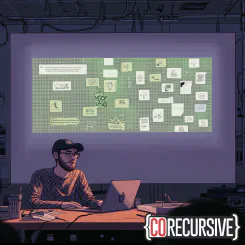
One Million Checkboxes
#108 Feb 3, 2025 55:00What if internet trolls could become your greatest collaborators? Nolen Royalty discovered this unexpected truth when his simple checkbox game went viral.
It began with a school email prank that crashed servers but sparked a philosophy: creative constraints breed innovation. From “Flappy Dird” to “One Million Checkboxes,” Nolen built games that turned limitations into …

Leaving Stripe
#107 Jan 2, 2025 51:00What if the only way to improve your life was leave your dream job behind?
Jon de la Motte failed his first Stripe interview, but he didn’t give up. It was his dream job, a company that connected his father’s work in finance with his software ambitions.
At Stripe, Jon faced challenges. He joined a risky JavaScript infrastructure team and struggled to find his footing. Eventually he …
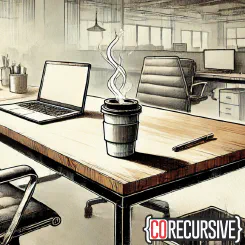
Inside Shopify's Layoffs
#106 Dec 2, 2024 42:00What if you had to break life-changing news to your team—could you handle the weight of their futures?
Allison’s journey from software engineer to compassionate leader at Shopify is filled with challenges and growth. It all started when her mentor was suddenly laid off, leaving her with uncertainty and guilt. This turning point taught her the importance of adaptability in the tech …

ReiserFS
#105 Nov 4, 2024 52:33Have you ever known someone whose technical brilliance was overshadowed by personal failings? This is the story of Hans Reiser, a software developer driven to create a superior Linux filesystem, but whose difficult personality got in the way.
Then came the disappearance of his wife, Nina, in 2006. The investigation pointed to Reiser, ending with a murder conviction that shocked the tech world. …

From Everest to Startups
#104 Oct 2, 2024 50:20How do you know what matters? What goals are worth pursing? What if training to climb Everest left you certain you were on the wrong career path?
Yoshio’s journey starts with disappointment in his academic path. Unsatisfied and aimless, he decides to climb Mount Everest, inspired by a childhood experience. This marks the beginning of a life-changing adventure.
Join us to hear Yoshio’s …
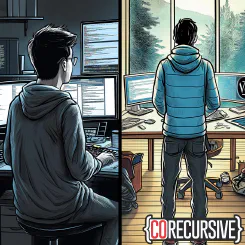
From Code to Capital
#103 Sep 2, 2024 46:47What if your corporate job left you feeling empty, and you decided to leap into venture capital?
Tim Chen, a software engineer, was disillusioned with corporate life at Microsoft. The 2008 market crash and layoffs deepened his dissatisfaction. Seeking more impactful work, Tim joined startups and contributed to open-source projects, like Kafka and Docker.
Then after his own start-up, Tim found a …
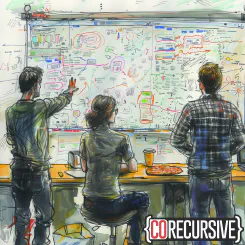
Navigating Corporate Giants
#102 Jul 4, 2024 49:30What if you had to fight against your company’s culture to bring a revolutionary tool to life? Meet Jeffrey Snover, the Microsoft architect behind PowerShell, a command tool that transformed Windows system administration. Initially met with skepticism, Snover’s idea faced resistance from a company that favored graphical interfaces.
Snover’s journey began with a simple mission: to …

From Burnout to Breakthrough
#101 Jun 4, 2024 52:00Can you imagine risking your career to making coding easier to learn?
Meet Felienne Hermans, a professor who did just that by stepping beyond academia to redefine coding education. Disillusioned by her research’s limited impact, Felienne discovered a new calling in teaching coding to underserved students. Her journey led to the creation of Hedy, a programming language designed to dismantle …
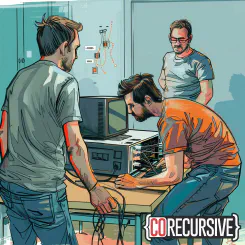
Coding Machines
#100 May 3, 2024 48:11What if the tools you trust were actually betraying you? Join us for a riveting story where a team of software developers discovers that their compiler is compromised. What starts as suspicion of a simple bug quickly escalates into the alarming realization.
In this 100th episode celebration past show regulars Don and Krystal join Adam lend their voice to this work of fiction about the limits of …
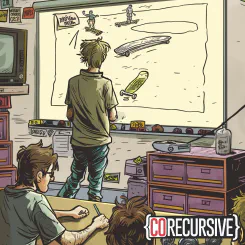
Code, Kickflips and Crunch Time
#099 Apr 2, 2024 57:00Meet Mick West, whose career began in an unusual office setup — sandwiched between a kebab shop and a phone sex hotline. From there he worked all over Manchester, making computer games for Tiertex and Ocean.
Career opportunies brought him to California and to his own game dev company, Neversoft. At Neversoft, navigating team growth and tight deadlines, Mick played a key role in creating …
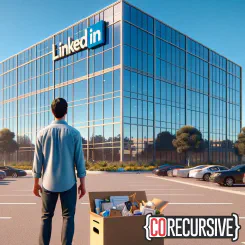
Leaving LinkedIn
#098 Mar 4, 2024 47:30What if your dedication to doing things right clashed with your company’s fast pace? Chris Krycho faced this very question at LinkedIn.
His journey was marked by challenges: from the nuances of remote work to the struggle of influencing company culture, and a critical incident that put his principles to the test against the company’s push for speed.
Chris’s story highlights the …
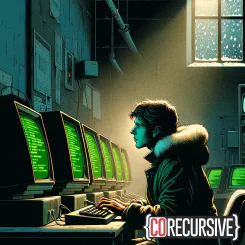
Beautiful Code
#097 Feb 2, 2024 57:00Have you ever felt like your code could be more than just functional, that it could be beautiful?
Greg Wilson didn’t just ponder this; he embarked on a quest to elevate software design to an art form. From a soldering iron burn that steered him away from electrical engineering to his crusade for a shared language in software architecture, Greg’s journey is a testament to the …
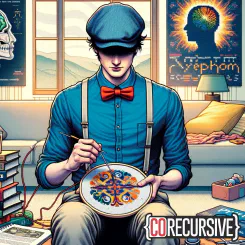
Code as a Lifeline
#096 Jan 2, 2024 44:11What if your dreams were suddenly ripped away? What if your talents vanished, your passions erased? That’s what happened to Jason McDonald when a traumatic brain injury at 16 ravaged his planned destiny of becoming a doctor. Jason painfully rebuilt his identity from scratch - relearning to read, write, even speak.
A serendipitous discovery of coding ignited a new passion within Jason. He …
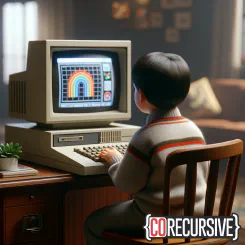
From 486 to Vue.js
#095 Dec 4, 2023 46:16From the early days of exploring creative possibilities on a 486 computer in his childhood to developing one of today’s most popular web frameworks, Evan You’s journey is a tale of passion and innovation.
Evan started Vue.js while working at Google, just wanting to scratch his own itch for a lightweight JavaScript framework. But soon Vue started to gain a huge following.
Eventually …
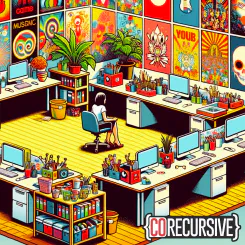
Platform Takes The Pain
#094 Nov 2, 2023 48:35How did Spotify scale from 10 engineers to 100s to 1000s …without slowing down? Without becoming corporate?
Facing an IPO deadline, Pia Nilsson worked with 300 teams to transform how Spotify built software. She spearheaded a movement that led them from working in silos to a unified developer platform.
Hear the inside story of how Spotify’s Platform teams embraced transparency and …
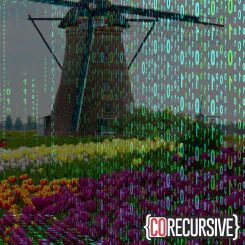
Sloot Digital Coding System
#093 Oct 2, 2023 51:49Lost treasure. Conspiracy theories. Impossible tech demos.
Jan Sloot claimed to have invented revolutionary data compression that could fit a full movie into a tiny smart card chip. Top executives and investors witnessed his demos and became true believers, ready to bankroll this company into the stratosphere.
But was it all an elaborate illusion?
Join me as I unravel the perplexing story of Jan …
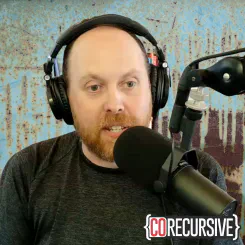
Configuring Identity
#092 Sep 1, 2023 42:53Today we go behind the scenes at Chef - the game changing infrastructure automation tool. Adam Jacob created Chef, and it became a massively popular DevOps tool. But despite Chef’s success, Adam constantly battled self-doubt and finding his footing as a leader.
In this raw episode, Adam shares how the pressure of going from sysadmin to startup CTO caused an identity crisis. He opens up about …

The Science of Learning to Code
#091 Aug 2, 2023 50:44Learning to code can feel impossible. Like facing a sheer rock wall with no ropes or harnesses. But what if there was a path up the mountain? A trail blazed smooth by master coders who went before?
In this episode, we’ll follow that path. We’ll hear the stories of legends like Seymour Papert, who championed active, project-based learning. Of Fred Brooks, who discovered that pairing …
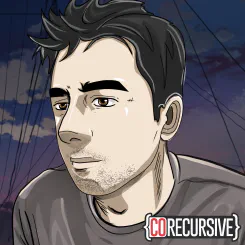
A Dark Room - From Code Hobo to Indie Game Developer
#090 Jul 3, 2023 40:41Have you ever been frustrated with your job? Maybe not burnt out, but getting close to there? You used to love what you did, and it felt so creative and empowering, but then it starts to feel a bit more cookie cutter.
Have you ever been frustrated with your whole life? The daily grind has taken what you love and it just doesn’t feel the same anymore. Some of the magic just has slowly faded …
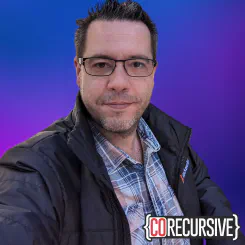
Quitting (And Then Rejoining) Stack Overflow
#089 Jun 2, 2023 53:27Today, we meet Ben Dumke-von der Ehe, one of the early developers on the Stack Overflow team.
He was on the front lines as the platform transformed how programmers worked. And he embodies the spirit of Stack Overflow: Its transparency, playfulness, and even some of its struggles to be as welcoming and friendly as it should be.
But you’ll see what I mean.
So stick around as Ben takes us on a …

From Project Management to Data Compression Innovator
#088 May 2, 2023 59:27How do you accomplish something massive over time? I’ve had the chance to meet with a number of exceptional software developers and it’s something I always wonder about.
Today, I might have an answer with the incredible story of Yann Collet.
Yann was a project manager who went from being burnt out on corporate life to becoming one of the most sought-after developers in the world. What …
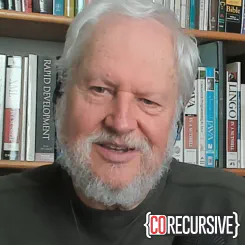
JSON vs XML
#087 Apr 3, 2023 49:55Today’s guest is Douglas Crockford. He’s sharing the story of JSON, his discovery of JavaScript’s good parts, and his approach to finding a simple way to build software. Also, his battles against XML, against complexity, his battles to say that there’s a better way to build software.
This is foundational stuff for the web, and Doug is an iconoclast.

Sun's Mobile Blunders
#086 Mar 2, 2023 51:44Shai Almog worked at Sun on Mobile JVMs just as phones started to turn from phones into something else.
Sun had deep expertise in mobile development, and unique engineering-driven culture, and relationships with manufacturers and operators. And yet internal politics and the collapse of its server market made it hard to get things done.
At Sun, as the mobile market changed, Shai and his friend Chen …
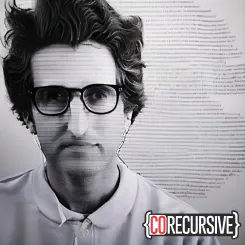
Shipping Graphing Calculator
#085 Feb 2, 2023 46:46I’ve been on many projects that get canceled. We’re building cool stuff. We’re going above and beyond, and we’re excited. But the project encounters reality, shifting priorities, or budgeting constraints, and the work never goes anywhere. It always feels tragic, but then I move on.
But what if I didn’t let a project get canceled? What if I couldn’t accept that? …
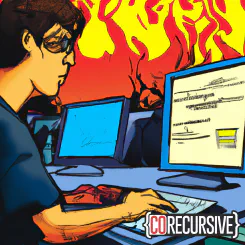
The Unfulfilled Engineer
#084 Jan 2, 2023 42:03Nothing good comes from being insecure about your worth, especially at your job. That’s what today’s episode is about. That’s what today’s guest is here to discuss.
It’s a slow burn, but if you listen to the end, I think you will value yourself more professionally. My Guest is Don Mckay. Someone longtime listeners will undoubtedly know.
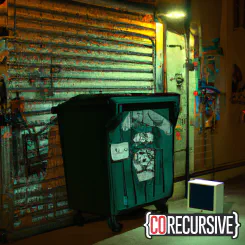
DOOMed to Fail: A Horror Story
#083 Dec 2, 2022 45:14Today Rebecca Burger Becky Heineman shares the tale of porting Doom to the 3DO console under extreme conditions. There is an engine to tweak, deadlines to hit, hardware acceleration to get working, and dramatic rock anthems to record.
We also learn about how game piracy led her to game development and what it was like to do game development in the mania of the mid-nineties. Finally, we close with …
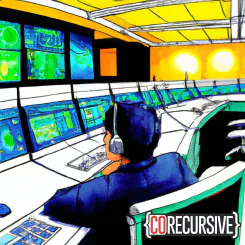
Software World Tour
#082 Nov 2, 2022 48:56Today’s story is from Son Luong Ngoc, who shares what it was like for him to work and live in many different countries around the world, including working for Alibaba at the Xixi campus in Hangzhou, China (Son’s photos of the Alibaba campus).
It’s a story of a software developer finding a place that fits them, a place that suits them.
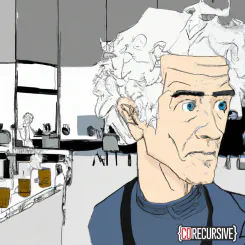
Android's Unlikely Success
#081 Oct 3, 2022 60:06What could you accomplish if your teammates were all excited and determined to hit some project timelines? What is it like for a group of people to give it all they have? That’s what today is about.
Chet Haase from the Android team is here to share the story of the early days of Android, the mobile operating system that powers the majority of phones worldwide. We’ll cover the years …

From Prison To Programming
#080 Sep 2, 2022 46:36I believe that getting underrepresented groups into software development is a good thing. This is not a controversial opinion until you start talking about felons.
Today’s guest is Rick Wolter. He’s an iOS developer who served 18 years in prison for second degree murder. Rick killed somebody and for some that’s all they need to know about Rick. But today’s episode is about …
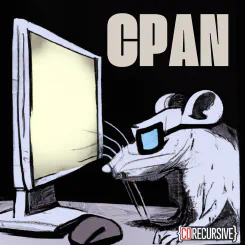
CPAN
#079 Aug 1, 2022 56:02CPAN was the first open-source software module repository. And on this day, Aug 1st, in 1995, CPAN was first announced to a private group of PERL users.
And why does this matter? Who is still using PERL anyhow? CPAN inspired everything that would follow: npm, maven, cargo, nuget, hackage, ruby gems, python pypi and so on.
If you are building things today by pulling in various packages from various …

The History and Mystery Of Eliza
#078 Jul 5, 2022 44:06I recently got an email from Jeff Shrager, who said he’d been working hard to solve a mystery about some famous code.
Eliza, the chatbot, was built in 1964, and she didn’t answer questions like Alexa or Siri. She asked questions. She was a therapist chatbot and quickly became famous after being described in a 1964 paper.
But here is the mystery. We’re not sure how the original …
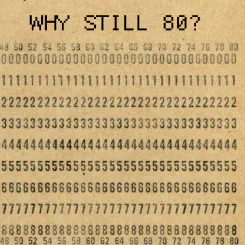
Why still 80 columns?
#077 Jun 1, 2022 39:22On June 1st, 2014, the following question showed up on hacker news:
Why is 80 characters, the standard limit for code width. Why 80?
Why not? 79 or 81 or even a hundred.
So you probably know what happens next. People started to post their opinions and the comments and other people started to disagree. The posts spread around the internet.
So that is going to be today’s show: Let’s …
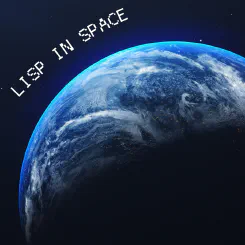
LISP in Space
#076 May 2, 2022 38:06Have you ever had a unique approach to a problem and been excited to use it, but you’re met with skepticism?
Today’s story: what happens if you take someone who’s passionate about LISP and put them in an organization where that’s just not how they write software.
Today’s story is about getting LISP into space.
The year is 1988. The USSR still existed. Ronald Reagan …

April Fools' Is Cancelled (2014)
#075 Apr 1, 2022 38:51On this day in 2014, “lame april fools’ jokes” were banned from hacker news.
Today in our first This-Day-in-History segment, I want to share some of history not just of April Fools’, but of tech pranks in general, all leading up to 2014.
Why were pranks and April Fools’ jokes traditionally celebrated in tech? Why are they now considered lame? And is there anything we …

The Story Graph
#074 Mar 2, 2022 48:16Whenever I work on a side project, I can’t help but daydream of it taking off in a big way. For today’s guests, something like that did happen.
When Nadia started building her side project, she didn’t know that it would end up spreading virally. She didn’t know that it would end up competing with an Amazon product. She didn’t know that keeping it up would be something …

Serenity OS
#073 Feb 2, 2022 41:28How would you build an operating system?
My answer is I wouldn’t. First off, I don’t know how. And the second thing is it seems like to large of a task. It took thousands of developers to build Windows XP.
But actually, it is possible to build an operating system from scratch. My guest is doing it. Andreas Kling created SerenityOS starting from an empty Git repository. So today, I find …

The Internet Is Made of Duct Tape
#072 Jan 2, 2022 42:22Today, I have two of my favorite guests together: Krystal Maughan and Don McKay. We are going to be sharing strange and interesting facts about computing.
I’m super pumped about this because, sometimes, I learn something new, and I’m excited about it. And I want to tell people about it. And so today is a chance for Don and Krystal and I to share some of these “Oh, my God. Did you …
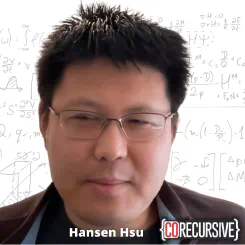
Cocoa Culture
#071 Dec 2, 2021 44:21The last episode, I said I wasn’t sure there was such a thing as culture, but that’s not the case. Every place I’ve worked has been a bit different, and often those differences had huge impacts on the software we built.
The team where people roll their eyes at UX feedback will not have as simple of a product as a team where the user experience is highly valued.
If software …
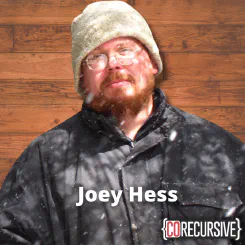
Leaving Debian
#070 Nov 2, 2021 40:26Today’s story is an insider view of Debian. One of the oldest Linux distributions and probably one of the longest-running volunteer-based open-source projects.
Joey Hess is my guest, and he dedicated significant parts of his adult life to working on Debian. He’s going to share what that was like. The good and the bad, and it’s almost all good.
It’s a story about open source …
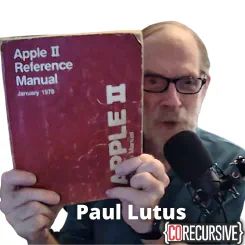
The Original Remote Developer
#069 Oct 4, 2021 41:41Today’s episode is about remote work. Well, sort of. I found someone with a different perspective on remote work and a fantastic story to share, Paul Lutus.
I think that he might be the original remote software developer.
He left California behind for a lower cost of living in Oregon. And from Oregon, he developed software for Apple. But the kind of surprising thing is he did this in the …

Quines, Polyglot Code and Other Fun Computations
#068 Sep 2, 2021 61:23Today, previous guest and my neighbor Don Mckay and I will discuss items from the endless fascinating Cursed Computer Iceberg Meme. The Iceberg is a giant list of “the peculiarities and weirdness of computers.”
We each a select few items from the list and alternate explaining it to each other. Don’s choices are varied, and mine focus on quines and esoteric coding problems. We …

Full-Time Open Source
#067 Aug 2, 2021 46:08Today’s show: How to quit your job and work on open source full time.
This story has it all – balancing side projects and full-time employment, building up enough supports to leave your job, and explaining quitting to your family and friends.
And also: what do you do if your project succeeds, and then someone forks it and builds a commercial business around it? And how do you deal with …

The Untold Story of SQLite
#066 Jul 2, 2021 38:34On today’s show, I’m talking to Richard Hipp about surviving becoming core infrastructure for the world. SQLite is everywhere. It’s in your web browser, it’s in your phone, it’s probably in your car, and it’s definitely in commercial planes. It’s where your iMessages and WhatsApp messages are stored, and if you do a find on your computer for *.db, …
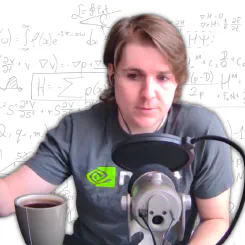
From Competitive Programming to APL
#065 Jun 2, 2021 53:40Today on the show, we have solving algorithmic programming problems. You know when you interview for a job to write CSS and they ask you to reverse a binary tree on the whiteboard using C and in constant memory space? It’s that kind of thing. These problems have their roots in algorithmic programming contests. And our guest, Conor Hoekstra, is a former competitor.
Conor’s story started …
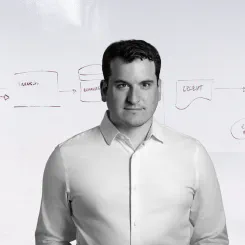
Smart Contract Rescue
#064 May 2, 2021 34:57Today I talk to Dan Robinson about trying to get someone their money back on Ethereum. He’s going to be battling this murky world of blockchain high-frequency bots. Along the way, we’ll learn how trades are executed on Ethereum and a bit of game theory and political philosophy.
It’s an entertaining peek into a world that seems like pure science fiction to me, a world where …
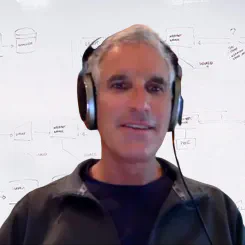
Apple 2001
#063 Apr 3, 2021 48:07David Shayer worked at Apple for 14 years, and he has a wild experience to share. Apple has a unique culture, and David will give us an insider view of what it was like for him at Apple during the 2000s, roughly between 2001 to 2015 when Apple transformed into the powerhouse that it is today.
David worked as a Software Engineer but for the hardware organization with Apple. He worked on a few …
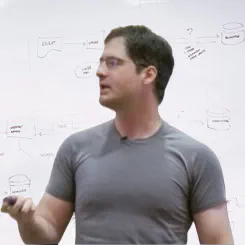
Video Game Programming From Scratch
#062 Mar 1, 2021 41:14I’m not really a big gamer, but lately, I’ve fallen down this rabbit hole into the world of Casey Muratori, and this project that he started on Twitch in 2014. He is building a video game from scratch and explaining it all as he goes along.
Casey is a professional video game and game engine, creator. He has been doing it for over 30 years. His approach to development feels a little bit …
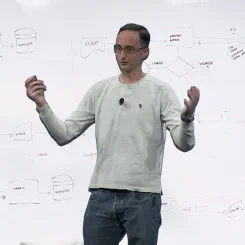
Reinforcement Learning At Facebook
#061 Feb 1, 2021 38:05If you ever wanted to learn about machine learning you could do worse than have Jason Gauci teach you. Jason has worked on YouTube recommendations. He was an early contributor to TensorFlow the open-source machine learning platform. His thesis work was cited by DeepMind.
But what I find so fascinating with Jason is he recognized this problem that was being solved the wrong way and set out to find …

2020 Year End
#060 Jan 1, 2021 34:26Welcome to the year-end episode. Today is all the bonus questions. Often times I have questions that I want to ask guests, but they don’t quite fit the overall theme of the episode. So today we’re going to do a whole episode of those extra questions.
I have previously recorded questions for Brian Kernighan, the creator of AWK among many other things. I have questions for Sean Allen, …
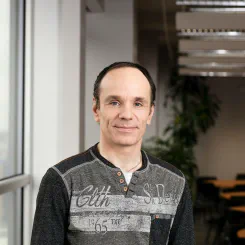
Frontiers of Performance
#059 Dec 1, 2020 47:09Did you ever meet somebody who seemed a little bit different than the rest of the world? Maybe they question things that others wouldn’t question or said things that others would never say. Daniel is a world-renowned expert on software performance, and one of the most popular open-source developers, if you measure by Github followers. Today, he’s gonna share his story. It involves time …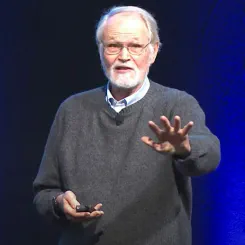
The Birth of UNIX
#058 Nov 1, 2020 51:09When you work on your computer, there are so many things you take for granted: operating systems, programming languages, they all have to come from somewhere.
In the late 1960s and 1970s, that somewhere was Bell Labs, and the operating system they were building was UNIX.
They were building more than just an operating system though. They were building a way to work with computers that had never …
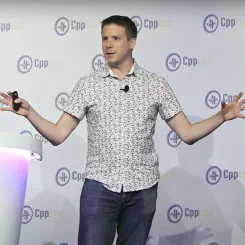
To The Assembly
#057 Oct 1, 2020 41:19How do CPUs work? How do compilers work? How does high-level code get translated into machine code? Today’s guest is Matt Godbolt and he knows the answers to these questions.
How he became an expert in bare metal programming is an interesting story. Matt shares his origin story and the creation of compiler explorer in today’s interview.
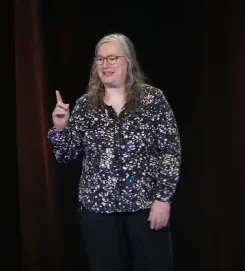
Memento Mori
#056 Sep 1, 2020 40:32Preparing our minds for the inevitable is hard. But, after facing terminal cancer, Kate Gregory recalled that facing death has many lessons to teach us.
In this episode, Kate will share the lessons she learned and explain how you can apply them to your career as a software developer and live a remarkable life.
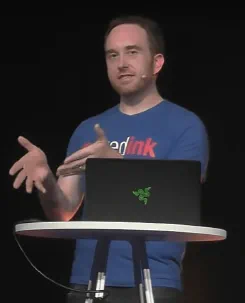
We're Teaching Functional Programming Wrong
#055 Aug 3, 2020 46:39Today Richard Feldman shares his story of going from javascript developer to elm developer to functional programming teacher.
Along the way, Richard finds that people are teaching functional programming wrong. We are teaching it in a way that misses how most industrial software engineers learn best.
Richard also delves into Elm, his approach, and how to make teaching delightful.
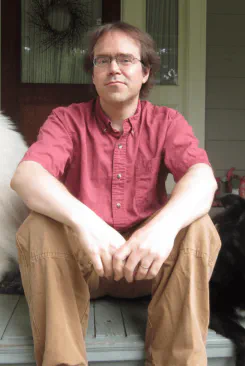
Software That Doesn't Suck
#054 Jul 1, 2020 37:20Software is just the tool and it should get out of your way. In this episode, Jim discusses how to build a great developer tool. It all started with: “What’s the worst software that you use every day?” and led to the creation of Subversion.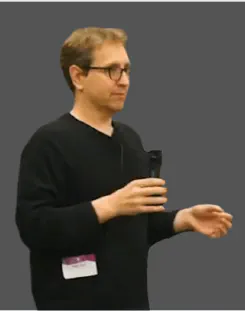
Unproven Techology Case Study
#053 Jun 10, 2020 39:06Choosing the programming language or framework for a project can be to the success of the project.
In today’s episode, Sean Allen shares a story of picking the right tool for a job. The tool he ends up picking will surprise you.
His problem: make a distributed stream processing framework, something that can take a fire hose of events and perform customer’s specific calculations on them but …

Krystal's Story
#052 May 18, 2020 40:23Things are easier to learn when you are passionate about something. A lot of great careers are built on curiosity and obsession including Krystal Maughan our guest for today’s episode.
Krystal will share her journey as she chased her curiosity in programming wherever it led her.
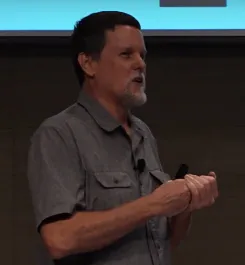
Learning a new language
#051 May 5, 2020 35:37There’s joy that can be found in language learning and pain as well. Whether you’re a beginner or an expert, there are still some things you can only discover by picking up a new language.
Bruce Tate will tell us how learning new languages rekindled the spark of joy for him.
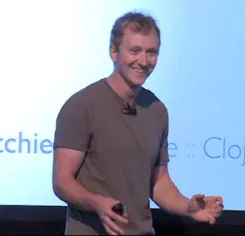
Portal Abstractions with Sam Ritchie
#050 Apr 17, 2020 35:10Today the story of how twitter engineers came up with a unique solution to data engineering.
Adam interviews Sam about how the abstract algebra and probabilistic data structures help solve fast versus big data issues that many are struggling with.
Adam talks to Sam Ritchie, a machine learning researcher. Stop in to hear Adam and Sam’s conversation about portal abstractions that let you …
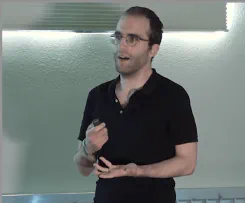
Loving Legacy Code with Jonathan Boccara
#049 Apr 3, 2020 26:50Legacy code is everywhere. I don’t think I’ve met anyone who doesn’t have to deal with legacy code in the substantial portion of his work.
Our guest, Jonathan Boccara is a French C++ developer and the author of The Legacy Code Programmer’s Toolbox. In this episode, Jonathan will help us understand and build the correct mindset to effectively work with legacy code by using …
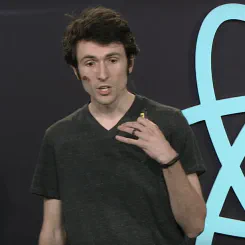
The Reason For Types
#048 Mar 16, 2020 36:35Adam talked to Jared Forsyth about his journey from untyped javascript to using flow and eventually reasonml.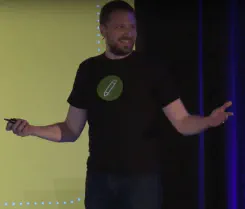
Karl L Hughes on Conference Talks
#047 Mar 2, 2020 50:30Adam talks to Karl Hughes about his path to becoming a conference speaker and the work he has done to make it easier for others to follow in his footsteps.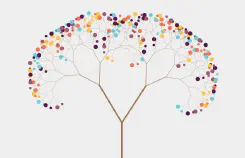
Don and Adam Discuss Folds
#046 Feb 15, 2020 36:16Today we try a different format. Adam invites his neighbour, Don McKay, over to ask him questions. An interesting discussion on recursion, corecursion and the naming of the podcast unfolds.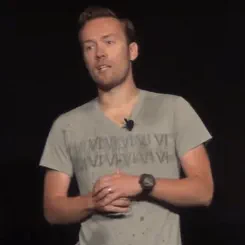
David Heinemeier Hansson
#045 Feb 1, 2020 1:02:08David Heinemeier Hansson talks to Adam about avoiding a software monoculture. He explains why we should find a programming language that speaks to us, why ergonomics matter, and why single page apps and microservices are not for him.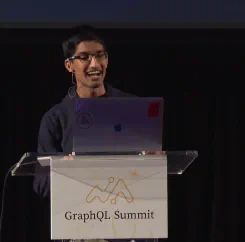
React and Scala JS
#044 Jan 16, 2020 38:51Today Adam talks to Shadaj Laddad. What is React? Why do we need front end frameworks at all. Shadaj explains modern front end web development. He also explains why he likes to use react from scala.js and built a framework to make that easy for all.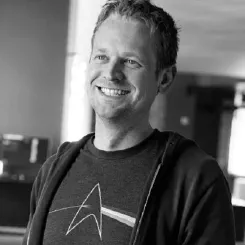
The Business Of Developer Tools
#043 Dec 17, 2019 37:00How do you build a business around tools for software engineers? Adam talks to Lee Edwards, a VC who spends a lot of time thinking about this question.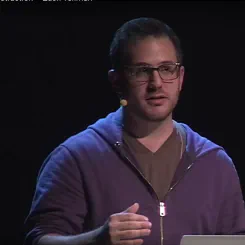
Software in Context
#042 Dec 2, 2019 53:20Adam talks to Author and Clojure advocate Zach Tellman about how great software is built.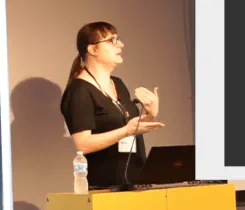
Beautiful and Useless Coding
#041 Nov 16, 2019 52:19Generative Art involves using the tools of computation to creative ends. Adam talks to Allison Parrish about how she uses word vectors to create unique poetry. Word vectors represent a fundamentally new tool for working with text.
Adam and Allison also talk about creative computer programming and building twitter bots and what makes something art.
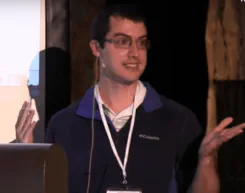
Tech Evangelism
#040 Nov 1, 2019 67:13What makes some pieces of technology take off? Why is java popular and not small talk or Haskell?
Gabe is a popular blogger, a former Haskell cheerleader, and creator of the Dhall configuration language. Today we talk about marketing and tech evangelism.
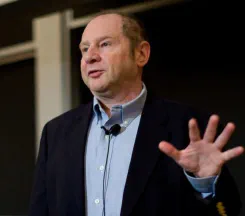
Language Oriented Design
#039 Oct 1, 2019 56:27Adam talks to Hal Abelson about the textbook he coauthored in 1985, The Structure and Interpretation of Computer Programs and why it is still popular and influential today.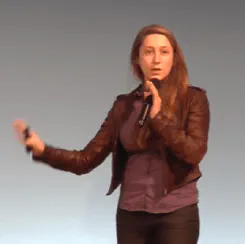
Open Source Health and Diversity
#038 Sep 15, 2019 41:33Heather Miller is an Assistant Professor at CMU. She is concerned that key open source projects are at risk of failure and no one is paying attention. Adam talks to her about open source, how it grows, the diversity problems it has and much more.
Heather also shares some interesting stories about the early days of Scala and her ideas for increasing diversity in tech.
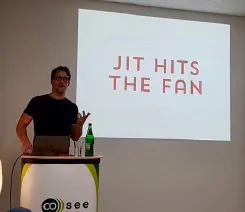
Learning About Compilers
#037 Sep 1, 2019 58:35What do compilers do? What is the runtime of a language? What does it mean to compile something down to bytecode and what executes the bytecode. Throsten Ball answers these questions in this interview with Adam.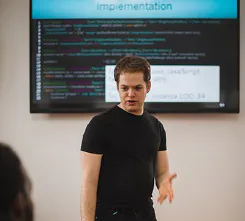
Advanced Software Design
#036 Aug 16, 2019 53:20How do we create great software? What are the important skills need to properly review a PR? How do you identify assumptions of a code base and the stable contracts of a software module?
Jimmy Koppel is working on his Ph.D. in the field of program synthesis at MIT. He was previously paid 100 thousand dollars to drop out of university by Peter Thiel, yet still graduated with two degrees.
The most …
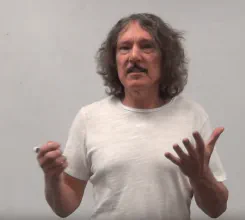
Category Theory
#035 Aug 15, 2019 53:39Today Adam talks to Bartosz Milewski. He is the author of a popular blog series, lecture series, and now book on Category Theory for programmers.
The world of functional programming is rife with terminology imported from abstract algebra and Category Theory. In fact, it may be one of the most valid criticisms of functional programming is the use of Category-Theoretic terminology that can be …
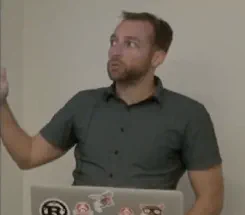
Using TypeScript Like A Pro
#034 Jul 15, 2019 70:54How do we make javascript easier to work with? Chris Krycho has been using typescript to add types to javascript since 2016.
Chris is a software developer at LinkedIn who, at his previous gig, worked on converting one of the largest Ember apps in the world to TypeScript. I was shocked by the size. Chris also loves Rust and types and is a former C and FORTRAN programmers. He hosted a podcast called …
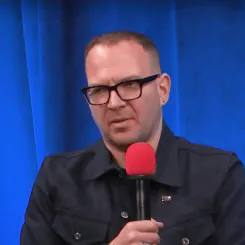
Rethinking Technological Positivism
#033 Jun 15, 2019 61:19Self-driving cars or armed autonomous military robots may make use of the same technologies. In a certain sense, we as software developers are helping to build and shape the future. What does the future look like and are we helping build the right one? Is technology a force for liberty or oppression.
Cory Doctorow is one of my favorite authors and also a public intellectual with a keen insight …
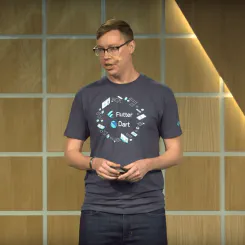
How to Build a Programming Language
#032 May 31, 2019 56:13Bob Nystrom is the author of Crafting Interpreters. I speak with Nystrom about building a programming language and an interpreter implementation for it. We talk about parsing, the difference between compiler and interpreters and a lot more.
If you are wondering why many languages have hand-rolled parser implementations yet much content on building languages implementations focuses on parser and …
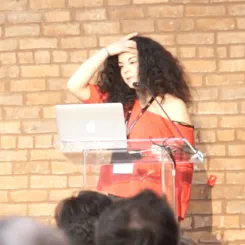
Refinement Types
#031 May 15, 2019 50:51Formal verification and type systems - how do they relate? Niki Vazou is on a mission to bring better formal verification to the masses.
I have done a couple of episodes about dependent types and my feeling is that dependent types are super powerful and have some conceptual simplicity ( Types are a first class concept ) but are somewhat tricky to wield in practice.
Refinement types are something …
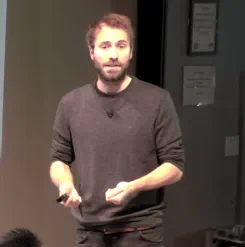
Rethinking Databases
#030 Apr 30, 2019 58:51Can we make databases faster and remove the need for caching reads in an external cache? Can we make a distributed SQL based relational database that outperforms memcached? Jon Gjengset and the PDOS team at MIT CSAIL have done just that with Noria.
Today I talk to Jon about Noria, about building a database in Rust and his efforts to teach people intermediate Rust via live coding sessions.
Jon was …
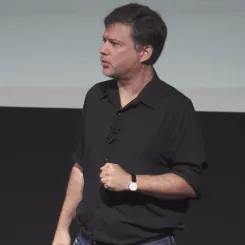
Learning to Think
#029 Apr 15, 2019 53:0Andy Hunt is a celebrity in the world of software development. Or at least he is one to me. The Pragmatic Programmer is a classic book on software development book. He is an author of the agile manifesto and started the book company that has published many great books, including several by recent guests.
Today I talk to Andy about how software engineers can get better at thinking and learning. How …
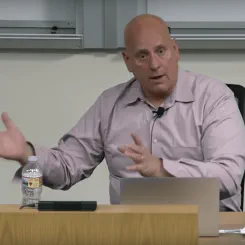
Data and Scale
#028 Mar 31, 2019 56:15Pat Helland has a wealth of knowledge on building distributed data stores. He has been working on distributed data stores since 1978, when he worked on the tandem fault-tolerant database. Since then he has been involved in many distributed database projects.
Here is the key thing, he is also a master at explaining the key ideas of distributed systems using simple language and practical everyday …
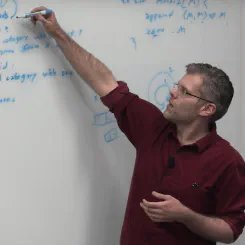
Abstraction and Learning
#027 Mar 15, 2019 49:28What is abstraction? Can we have a precise definition of abstraction that, once understood, makes writing software simpler?
Runar has thought a lot about abstraction and how we can choose the proper level for the software we write.
In this interview, he explains these concepts using examples from the real world. Examples include SQL, effectful computing and several others areas.
We also talk about …
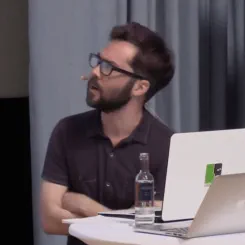
Modern Systems Programming
#026 Feb 22, 2019 0:00Richard Whaling has an interesting perspective on software development. If you write software for the JVM or if you are interested in low level system programming, or even doing data heavy or network heavy IO programming then you will find this interview interesting.
We discuss how to build faster software in a modern fashion by using glibc and techniques from system programming. This means using …
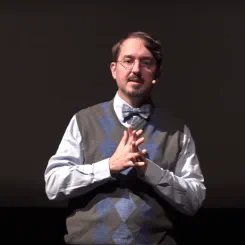
Recreational Coding
#025 Jan 25, 2019 62:01A decade ago Jamis Buck was not loving his job. He was an important open source contributor. He worked for the hottest trendiest software company at the time, 37 signals, creator of ruby on rails.
He was on top of the world but also he was burnt out.
Today Jamis talks about how he overcame burn out.
We discuss how his struggle lead him to write a book about generating mazes and another about …
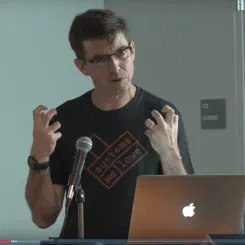
Software as a Reflection of Values
#024 Dec 18, 2018 79:05Which operating system is the best? Which programming language is the best? What text editor?
Bryan Cantrill, CTO of Joyent says that is the wrong question. Languages, operating systems and communities have to make trade offs and they do that based on their values. So the right language is the one who’s values align with you and your projects goals.
This simple idea carries a lot of weight …
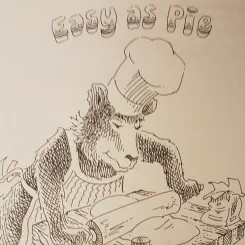
The Little Typer
#023 Dec 1, 2018 67:20You can write more correct software and even rigorous mathematical proofs. Prepare for some mind stretching.
Previous guests like Edwin Brady and Stephanie Weirich have discussed some of the exciting things a dependent type system can do Miles Sabin said dependent types are surely the future. This interview is to get us ready for the future.
Daniel P. Friedman is famous for his …

Big Ball Of Mud
#022 Nov 14, 2018 60:26In 1997, researchers analyzed the actual architectures of software in the field. The horrifying results: a large portion were best described by colorful phrases like “big ball of mud” and “sweep it under the rug.”
Wade Waldron talks about designing reactive applications and systems and how to avoid these anti-patterns. We also cover when a monolith is the right choice, …
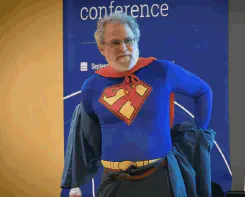
God's Programming Language
#021 Oct 22, 2018 60:13Does God Code in Haskell?
Professor and accomplished programming language researcher Philip Wadler believes that typed lambda calculus was discovered not invented – part of the underpinnings of the universe itself. As a result, functional programming languages are more fundamental and deeply justified than their alternatives.
We talk about this principle, which has guided his career. Phil …
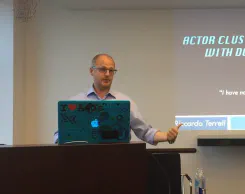
Concurrency and Functional Programming
#020 Oct 3, 2018 62:03When Riccardo Terrell hit the concurrency limitations in a jvm application, he thought back to the haskell he learned in a university course and decided to rewrite the entire thing in haskell. The immutability of the haskell solution made the concurrency bottleneck non-existent. It is no surprise that years later, his book on concurrency in .net leans heavily on functional programming constructs …
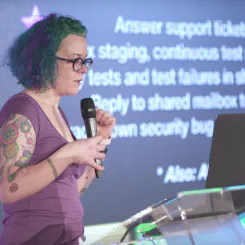
Test in Production
#019 Aug 31, 2018 47:59Today’s Interview is with Charity Majors. We talk about how to make it easier to debug production issues in today’s world of complicated distributed systems. A warning, There is some explicit language in this interview.
I originally saw a talk by Charity where she said something like fuck your metrics and dashboards, you should test in production more. It was a pretty hyperbolic …
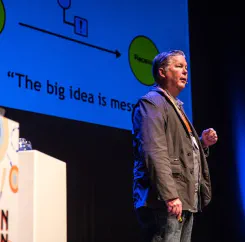
Domain Driven Design and Micro Services
#018 Aug 17, 2018 49:11Today I talk to Vaughn Vernon about how Domain Driven Design can help with designing micro services. The guidelines that Vaughn has developed in his work on DDD can provide guidance for where service and consistency boundaries should be drawn. We also talk about the platform he is developing for applying these DDD concepts using the actor model, Vlingo.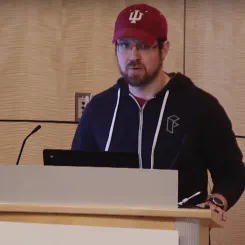
Typeful Functional Streaming HTTP
#017 Jul 27, 2018 50:59The promise of functional programming is code that is easier to reason about, test and maintain. Referential transparency means there is no extra context to worry about, we can just focus on inputs and outputs. Examples of functional programming in the small are plentiful. Fibonacci is easy to write as a function but what about fp in the large?
Http4s is a web framework written in scala that takes …
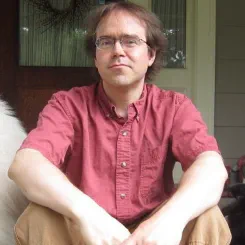
Moves and Borrowing In Rust
#016 Jul 3, 2018 64:00The surprising thing about rust is how memory management works. Rust has the concepts of moves and borrowing. If you have heard about Rust, you may have heard people talking about the borrow checker and trying to make it happy. In this interview, Jim Blandy walks us through what these concepts mean and how they work. We also talk about how to avoid fighting with the borrow checker at all and why …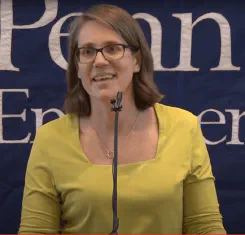
Dependent Types in Haskell
#015 Jun 13, 2018 58:44At Strange Loop 2017, I wandered into a talk where I saw some code that deeply surprised me. The code could have been python if you squinted, passing dictionaries around, no type annotations anywhere.
Yet, key lookup in the dictionary was validated at compile time. It was a compile-time error to access elements that didn’t exist. Also, the dictionary was heterogeneous, the elements had …
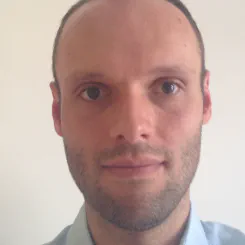
Microservices Architecture
#014 Jun 6, 2018 66:32I don’t know a lot about microservices. Like how to design them and what the various caveats and anti-patterns are. I’m currently working on a project that involves decomposing a monolithic application into separate parts, integrated together using Kafka and http.
Today I talk to coauthor of upcoming book, Reactive Systems Architecture : Designing and Implementing an Entire Distributed …

Rust And Bitter C++ Developers
#013 May 16, 2018 62:53Today I talk with Jim Blandy, one of the authors of Programming Rust. We talk about what problems rust is trying to solve, the unique language features and type system of rust. It includes both algebraic data types, type classes, and generics. We also touch on why it is so hard to secure code. Jim works on Firefox and his insights into the difficulty of writing secure code are super interesting.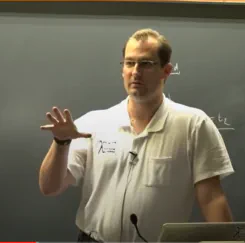
Distributed Systems
#012 May 2, 2018 66:26Today’s interview is with Steven Proctor, the host of the functional geekery podcast. We talk about distributed programming in general and specifically how erlang supports distributed computing. We also talk about things he’s learned about functional programming and applying FP principles to various non FP contexts.
Graphql
#011 Apr 18, 2018 55:35What is GraphQL and when should you use it? Oleg Illyenko is primary creator of Sangria, a graphql implementation used by twitter, The New York Times and many other companies. We discuss the problems that graphql solves, how sangria works and the problems of api design.
According to Oleg, GraphQL gives you a type system for your API.

PureScript
#010 Apr 4, 2018 51:6Purescript is a functional programming language that compiles to JavaScript. It is a strict haskell dialect that can run anywhere that javascript does.
Justin Woo is a self described PureScript evangelist and enthusiast. We talk about PureScript vs Elm and working with expressive type systems. Justin also had some great metaphors about phantom types and masking tape as well as avacados and …
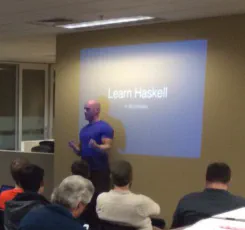
Throwaway the Irrelevant
#009 Mar 21, 2018 68:24John De Goes and I talk flame wars, monad transformer performance, IO monad flavours, and reasoning about polymorphic type signatures. On the lighter side, we discuss how to write technical articles well and Zee vs Zed pronunciation.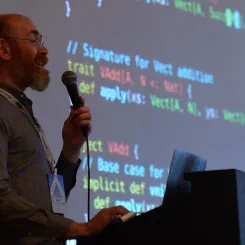
Generic Programming
#008 Mar 7, 2018 60:38When Miles Sabin applied to speak at a conference on generic programming, he bluffed a little bit. He would present on porting Simon Peytons Jone’s scrap your boilerplate functionality to Scala. Once his talk was accepted, he only had one thing left to do, implement it.
Generic programming is the type of polymorphism your language does not directly support. To me this seems paradoxical, as once …

Total Programming Using Swift
#007 Feb 12, 2018 53:56In simple terms, a total function is a function that produces a well defined output for all possible inputs. A total program is a program composed of only total functions.
A non-total, or partial function, would be a function that can fail given certain inputs. Such as taking the head of a list, which can fail if giving an empty list and is therefore non-total.
Total programming can be done in …
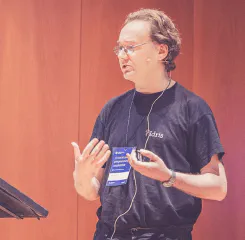
Type Driven Development and Idris
#006 Jan 29, 2018 59:37Edwin Brady is the creator of the Idris programming language and Author of the book Type-Driven Development with Idris and a computer science lecturer. The book, the language and Edwin himself all seem to be chock full of ideas for improving the way computer programming is done, by applying ideas from programming language theory.
In this interview, we discuss dependent types, type holes, …
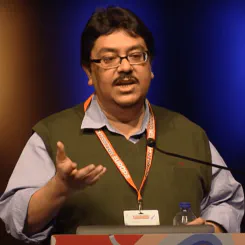
Algebraic Domain Modelling using Functions
#005 Jan 22, 2018 58:56In object oriented languages, modeling a complex problem domain is a well understood process. Books like Domain Driven Design contain techniques for breaking down a problem domain and earlier books like the gang of four book catalogue design patterns for modeling these domains in an object oriented way.
In today’s interview Debashish Ghosh explains how to model a complex problem domain in a …
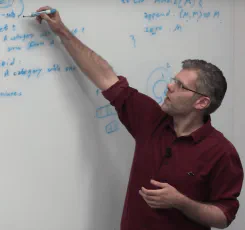
Design Principles From Functional Programming
#004 Jan 10, 2018 51:12Runar Bjarnason has been exploring how writing in a functional style increases modularity and compositionality of software for many years. He is co-author of functional programming in scala, a book that teaches these principles in scala. It is a very challenging yet very rewarding book, sometimes referred to as simple ‘the red book’.
In this interview Runar explains how writing in a functional …

Scala at Duolingo
#003 Jan 7, 2018 53:17Doulingo is a language learning platform with over 200 million users. On a daily basis millions of users receive customized language lessons targeted specifically to them. These lessons are generated by a system called the session generator.
In this episode, Andre talks about the reasons for the rewrite, what drove them to move to scala and the experience of moving from one technology stack to …
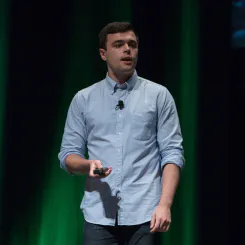
Incident Response
#002 Jan 5, 2018 51:26As a system becomes more complex, the chance of failure increases. At a large enough scale, failures are inevitable. Incident response is the practice of preparing for and effectively recovering from these failures.
In this interview Emil argues that we need to move beyond tribal knowledge and incorporate practices such as an incident command system and rigorous use of checklists. Emil suggests …
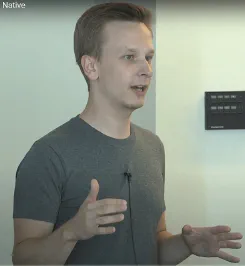
Scala Native
#001 Jan 1, 2018 48:17Scala is a functional and object oriented programming language built on the JVM. Scala Native takes this language, loved by many, and brings it to bare metal. Scala Native is an optimizing ahead-of-time compiler and lightweight managed runtime designed specifically for Scala.
Denys Shabalin is a Research Assistant at the EPFL and the primary creator of Scala Native. In this episode, I interview …
